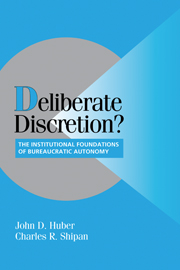Book contents
- Frontmatter
- Contents
- List of Tables
- List of Figures
- Preface
- 1 LAWS, BUREAUCRATIC AUTONOMY, AND THE COMPARATIVE STUDY OF DELEGATION
- 2 RATIONAL DELEGATION OR HELPLESS ABDICATION? THE RELATIONSHIP BETWEEN BUREAUCRATS AND POLITICIANS
- 3 STATUTES AS BLUEPRINTS FOR POLICYMAKING
- 4 A COMPARATIVE THEORY OF LEGISLATION, DISCRETION, AND THE POLICYMAKING PROCESS
- 5 LEGISLATION, AGENCY POLICYMAKING, AND MEDICAID IN MICHIGAN
- 6 THE DESIGN OF LAWS ACROSS SEPARATION OF POWERS SYSTEMS
- 7 THE DESIGN OF LAWS ACROSS PARLIAMENTARY SYSTEMS
- 8 LAWS, INSTITUTIONS, AND POLICYMAKING PROCESSES
- APPENDIX A MMC LAWS USED IN CHAPTER 3
- APPENDIX B POLICY CATEGORIES USED FOR MMC LAWS IN CHAPTER 3
- APPENDIX C PROCEDURAL CATEGORIES USED FOR MMC LAWS IN CHAPTER 3
- APPENDIX D THE FORMAL MODEL OF DISCRETION
- References
- Author Index
- Subject Index
- Titles in the series
APPENDIX C - PROCEDURAL CATEGORIES USED FOR MMC LAWS IN CHAPTER 3
Published online by Cambridge University Press: 05 June 2012
- Frontmatter
- Contents
- List of Tables
- List of Figures
- Preface
- 1 LAWS, BUREAUCRATIC AUTONOMY, AND THE COMPARATIVE STUDY OF DELEGATION
- 2 RATIONAL DELEGATION OR HELPLESS ABDICATION? THE RELATIONSHIP BETWEEN BUREAUCRATS AND POLITICIANS
- 3 STATUTES AS BLUEPRINTS FOR POLICYMAKING
- 4 A COMPARATIVE THEORY OF LEGISLATION, DISCRETION, AND THE POLICYMAKING PROCESS
- 5 LEGISLATION, AGENCY POLICYMAKING, AND MEDICAID IN MICHIGAN
- 6 THE DESIGN OF LAWS ACROSS SEPARATION OF POWERS SYSTEMS
- 7 THE DESIGN OF LAWS ACROSS PARLIAMENTARY SYSTEMS
- 8 LAWS, INSTITUTIONS, AND POLICYMAKING PROCESSES
- APPENDIX A MMC LAWS USED IN CHAPTER 3
- APPENDIX B POLICY CATEGORIES USED FOR MMC LAWS IN CHAPTER 3
- APPENDIX C PROCEDURAL CATEGORIES USED FOR MMC LAWS IN CHAPTER 3
- APPENDIX D THE FORMAL MODEL OF DISCRETION
- References
- Author Index
- Subject Index
- Titles in the series
Summary
Listed below are examples of procedural instructions written into MMC legislation.
Time Constraints
New York, 1995 – SB5280: The legislature sets a sunset clause on the MMC authorization.
§2. This act shall take effect immediately and shall remain in full force and effect through December 31, 1996.
New Mexico, 1995 (HB 702): The legislature directs an agency to implement a program by a specific date.
Section 23. HEALTH CARE DELIVERY AND PAYMENT PLANS. – A. The health care task force and the New Mexico health policy commission and its staff, including the health care initiative, shall develop health care delivery and payment initiatives to support and provide universal health care for all New Mexicans by October 1, 1997. The proposals shall include, to the maximum extent possible, preventive, primary, acute, chronic and long-term care.
Information Requirements
Oregon SB 27 (1989): The legislature made sure that the agency would consult all relevant groups and in particular ensured that advocates for Medicaid clients would be given a seat at the policymaking table.
SECTION 4a. (1) The Health Services Commission shall consult with the Joint Legislative Committee on Health Care and conduct public hearings prior to making the report described in subsection (3) of this section. The commission shall solicit testimony and information from advocates for seniors; handicapped persons; mental health services consumers; low-income Oregonians; and providers of health care, including but not limited to physicians licensed to practice medicine, dentists, oral surgeons, chiropractors, naturopaths, hospitals, clinics, pharmacists, nurses and allied health professionals.
- Type
- Chapter
- Information
- Deliberate Discretion?The Institutional Foundations of Bureaucratic Autonomy, pp. 238 - 241Publisher: Cambridge University PressPrint publication year: 2002



